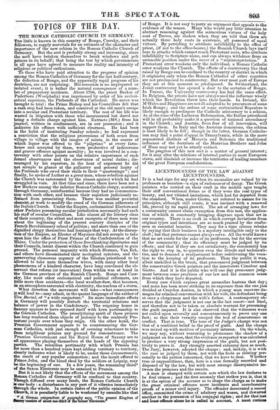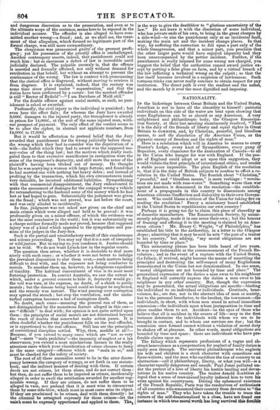LICENTIOUSNESS OF THE LAW AGAINST LICENTIOUSNESS.
IT is a bad sign for any art when its anomalies are valued by its professors as beauties—a sign of rudeness or of decay. The Greek painters who carried on their craft in the middle ages taught their stiff conventional forms as if they were the real typesof beauty, and not vitiated imitations, which had far departed from the standard. When, under Giotto, art referred to nature for its principles, although still crude, it was instinct with a renewed life, proved by its rapid growth. The art of arranging laws for a. community cannot claim exemption from this test, the applica- tion of which is constantly bringing disgrace upon that art in our country. There is no craft in which corrupt deviations from original types and intentions are so much praised by the crafts- men as essential beauties. They may for a time silence rebuke by saying that their business is a mystery intelligible only to the craft; but that pretence cannot always serve. All the world knows that no art exists for the sake of its professors, but for the service of the community ; that its efficiency must be judged by its effects; and that if they are not satisfactory, the community has the right to step in, to question even the details and technicali- ties, and to demand a readjustment before redelivering the voca- tion to the keeping of its professors. Thus the public it was, albeit unskilled in the brush, that pronounced judgment between the conservative Greek painters and the innovators Cimabue and Giotto. And it is the public who will one day pronounce judg- ment between some practices of our law and the common sense from which they have departed. Every ease which exposes great anomalies hastens that day; and none has been more striking in its exposure than the one just decided at Croydon Assizes, in which a young man recovers da- mages for criminal conversation with his wife, the defendant being at once a clergyman and the wife's father. A contemporary ob- serves that the judgment is not one in the last resort—not final, and therefore not to be taken as absolute warrant for presuming the guilt imputed. It is also observed that the witnesses were not called upon severally and consentaneously to prove any one fact; so that their veracity escaped the test of concurrence or conflict. That is true. The tone of the Judge's charge was not that of a confident belief in the proof of guilt. And the charge was mixed up with motives of pecuniary interest. On the whole, we may say, without venturing to pronounce the shadow of a judgment on the case, that the evidence as reported was calculated to produce a very strong impression of the guilt, but not pod- lively to prove it. Any strongly asserted calumny does as much. The Jury, however, adopted the charge ; and, luckily, it is with the case as judged by them, not with the facts as relating per- sonally to the parties concerned, that we have to deal. Whether true or supposititious, then, here is a case formally reeorde.d and disposed of by the law, but with most strange discrepancies be- tween the premises and the results. A man is charged with certain acts which the law declares to be foul crimes ; and the first anomaly that strikes you is, that it is at the option of the accuser so to shape the charge as to make the great criminal offences mere incidents and corroborative proofs of a minor civil injury. The offender desecrated a sacred office, committed the crime of adultery, and worse, and thwarted another in the possession of his conjugal rights ; and for that last and least offen.ce alone he is aaaied to account. A most curious and dangerous discretion as to the prosecution, and even as to the ultimate scope of the sentence, seems here to be reposed in the individual accuser. The offender is also alleged to have com- mitted another wrong—a fraud ; and, as we shall see, the treat- ment of that allegation, which formed no legitimate part of the formal charge, was still more extraordinary. The clergyman was pronounced guilty of the grossest profli- gacy; yet his possession of the priestly office is unchallenged. Another contempory asserts, indeed, that punishment could not reach him : but so enormous a defect of law is incredible until judicially- declared. The palpable anomaly is, that the offence is asserted and formally affirmed, not only without demand for retribution in that behalf, but without an attempt to prevent the continuance of the wrong. The law is content with pronouncing that the clerical office it disgraced, without moving to retrieve it from disgrace. It is explained, indeed, that the rectory was some time since placed under "sequestration," and that the duties have been performed by a curate : but the marked offender is still "Rector of Byfield"— I am Dutchess of Malfi still,"
For the double offence against social morals, as such, no pun- ishment is asked or awarded.
Professedly, the civil injury to the individual is punished ; but even here the effect fails ; for whereas the Jury have awarded 3,000/. damages to the injured party, the transgressor is already in prison for 14,0001., at the suit of the same injured man, with- . out prospect of payment. The only effect of the verdict seems to be to alter the cipher, in abstract not applicate numbers, from 14,000/. to 17,000/.
But it would be affectation to pretend belief that the Jury awarded that punishment for the wrong judicially before them : the wrong which they had to consider was the deprivation of a wife—the forfeit which they had to award was the supposed mo- ney-value of the thing lost ; but the motives which really insti- gated them to that excessive munificence in castigation were the sense of the trespasser's depravity, and still more the sense of the plaintiff's having been tricked out of money. He thought that he was marrying a woman with large fortune, and found that he had married one with nothing but heavy debts ; and instead of profiting by the transaction, which his own circumstances made very desirable, he incurred additional liabilities. Sympathizing with that commercial disappointment, the Jury endeavoured to make the assessment of damages for the conjugal wrong a vehicle for retransferring to the husband some of the money which he had lost or had hoped to gain. Substantially the judgment was given on the fraud ; which was not proved, was not before the court, and was only alluded to incidentally. In fine, judgment was not asked nor given on the chief and main crimes which were alleged and held to be proved : it was professedly given on a minor offence, of which the evidence was not the most conclusive in the world ; but it was substantially on a charge neither formally made nor proved, because that supposed injury was of a kind which appealed to the sympathies and pas- sions of the judges in the Jury-box. Such is the partial and unsatisfactory result of this cumbersome and solemn proceeding. You may say that it is a sort of irregular or wild justice. But in saying so, you condemn it. Justice should not be wild. We do not want Lynch-law in the regular courts. The question then arises, whether it is desirable to deal more nicely with such cases ; or whether it were not better to indulge the prevalent disposition to slur them over,—such matters being difficult to deal with, and the exposure not being conducive to morals. To smother them up, however, is a dangerous expedient of timidity. The habitual concealment of vice is its most most fostering protection. In convict Australia, we saw the extent to which, under a general consent to hide it, depravity would go : the veil was torn, at the expense, no doubt, of a shock to public morals ; but the disease being bared could no longer be neglected, and the remedy was instant. The wind passing over corruption may spread the stench ; but stop the ventilation and the undis- turbed corruption becomes a bed of contagious death.
No doubt, such cases—meaning the general run of them, as not distinguished by the monstrous feature alleged in this one— are " difficult " to deal with ; for opinion is not quite settled upon them : the principles of social morals are not determined beyond the reach of doubts that somewhat make action pause. It is often doubtful whether the punishment falls on the real offender, or is apportioned to the real offence. Still less are the principles of correctional discipline settled. Why, then, meddle at all ?— Because, if you extend to many cases which are "not so very bad"—mere " mala prohibita"—tbe impunity of neglect or a lax observance, you extend a most mischievous licence to the really atrocious cases which your classification of crime chooses to lump in the same category—offences which are "male in se," and must be checked for the safety of society. The root of all these anomalies seems to lie in the utter discre- pancy between the category of wrongs, as set forth in our statute- book, and the indirect manner of dealing with them. If certain deeds are not crimes, let them alone, and do not correct them : but then, do not suffer them to be imputed as crimes, incidentally alleged in order to swell the retribution awarded for another cog- nizable wrong. If they are crimes, do not suffer them to be alleged in vain, nor pretend that it is most wise to circumvent them by some side-blow, which must in most cases miss its object. Utley are proclaimed to be crimes, deal with them directly : let the criminal be arraigned expressly for those crimes—let the unish meat be expressly apportioned and applied to thew. That is the way to give the deathblow to "glorious uncertainty of the law." Do not leave it with the discretion of some individual, who has private ends of his own, to bring in the great charges by a side-wind—to aim the punishment only at an incidental fault, making- the main act and the incident change places. In that way, by suffering the correction to fall upon a part only of the whole transgression, and that a minor part, you proclaim that the other larger parts would have enjoyed impunity had they been unaccompanied by the pettier incident. Further, if the punishment is really imposed for some wrong not charged, you suggest the belief that the authorities cannot award justice ex- cept by putting a false gloss on facts, and by a virtual breach of the law inflicting a technical wrong on the culprit ; so that the law itself becomes involved in a suspicion of lawlessness. Such tortuous tricks can never really conduce to obtain respect for any institution. The direct path is ever the readiest and the safest, and the march by it ever the most dignified and imposing.



























 Previous page
Previous page